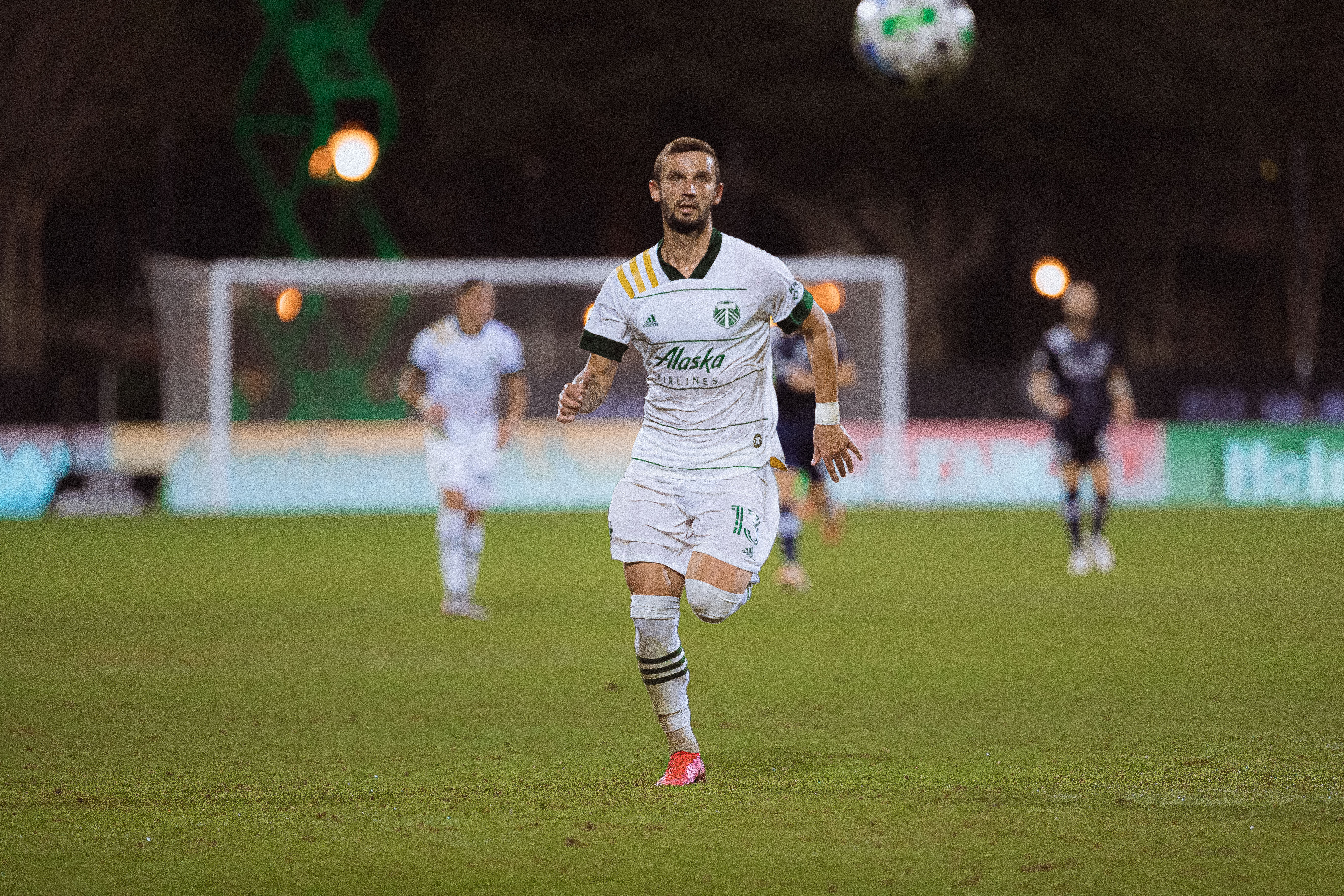To view this content, you must be a member of the Rose City Review Patreon
Already a qualifying Patreon member? Refresh to access this content.
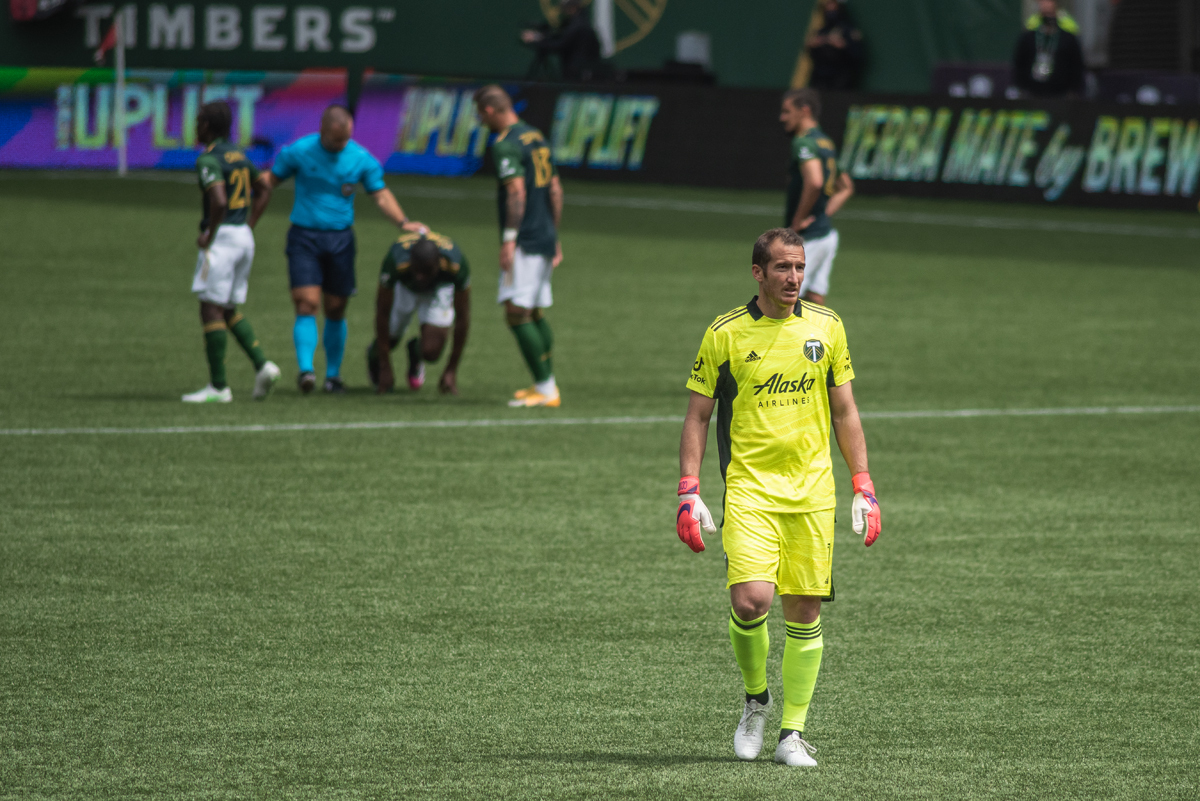

Portland midfielder Eryk Williamson’s downtown apartment is pretty simple. There’s furniture and standard appliances, but nothing out of the ordinary. In both appearance and purpose, it’s just a place for him to crash between team training sessions and games.
Just two canvases hang from the apartment’s beige walls. One is a classic world map. The other is a picture of Williamson and his close friend—and Timbers teammate—Jeremy Ebobisse.
The lack of pictures and wall art throughout the apartment gives more weight to what is hung up. That’s certainly true with the cropped picture of him and Ebobisse, which was taken during Portland’s 2019 media day. In it, Ebobisse is hanging onto Williamson’s back. Both are smiling.
Computer, enhance #RCTID pic.twitter.com/OngA6EyB8k
— Rose City Review (@rosecityreview1) February 5, 2021
“It’s one of the two canvases I have up in my place,” Williamson said. “It’s one that really speaks to our relationship. About how I have his back, and he has my back.”
Ebobisse and Williamson have built a rapport on the field, but their relationship didn’t start in Portland. They’ve known one another since they were teenagers playing youth soccer in the Washington, DC suburbs. When they grew older, they became teammates in the United States youth national team system and competed at the Under-20 World Cup in South Korea together.
Now, they’re both expected to play important roles for a Timbers team with MLS Cup aspirations. The photo from that 2019 media day serves as a humbling reminder of where both players started and how they’ve progressed in their careers. Most importantly, it’s a symbol of their close bond years in the making.
“We’re always joking around, Ebobisse said. “They just so happened to capture that moment with a picture.”
It’s not uncommon to hear multiple languages at Portland’s training sessions. Those nearby are just as likely to witness coach Giovanni Savarese belting out instructions in Spanish as they are to hear players shout at each other in French or English during a heated drill.
Listen carefully and you also might also hear the word “sice.” It sounds natural in conversation, but like other regional jargon, it stands out.
The term is DC lingo used after a hyperbolic or exaggerated saying, commonly after jokes. Williamson gave the example of calling someone’s foot bigger than their head. Because that isn’t true, it’s often followed “sice” or “I’m sicing you.” It’s a small thing, but speaks to a commonality Williamson and Ebobisse share from growing up just miles apart.
“That’s something that me and Jeremy have on a lot of guys,” Williamson said. “We have this lingo and can get around explaining it to them, or use it as our own little word that we use until they figure it out.”
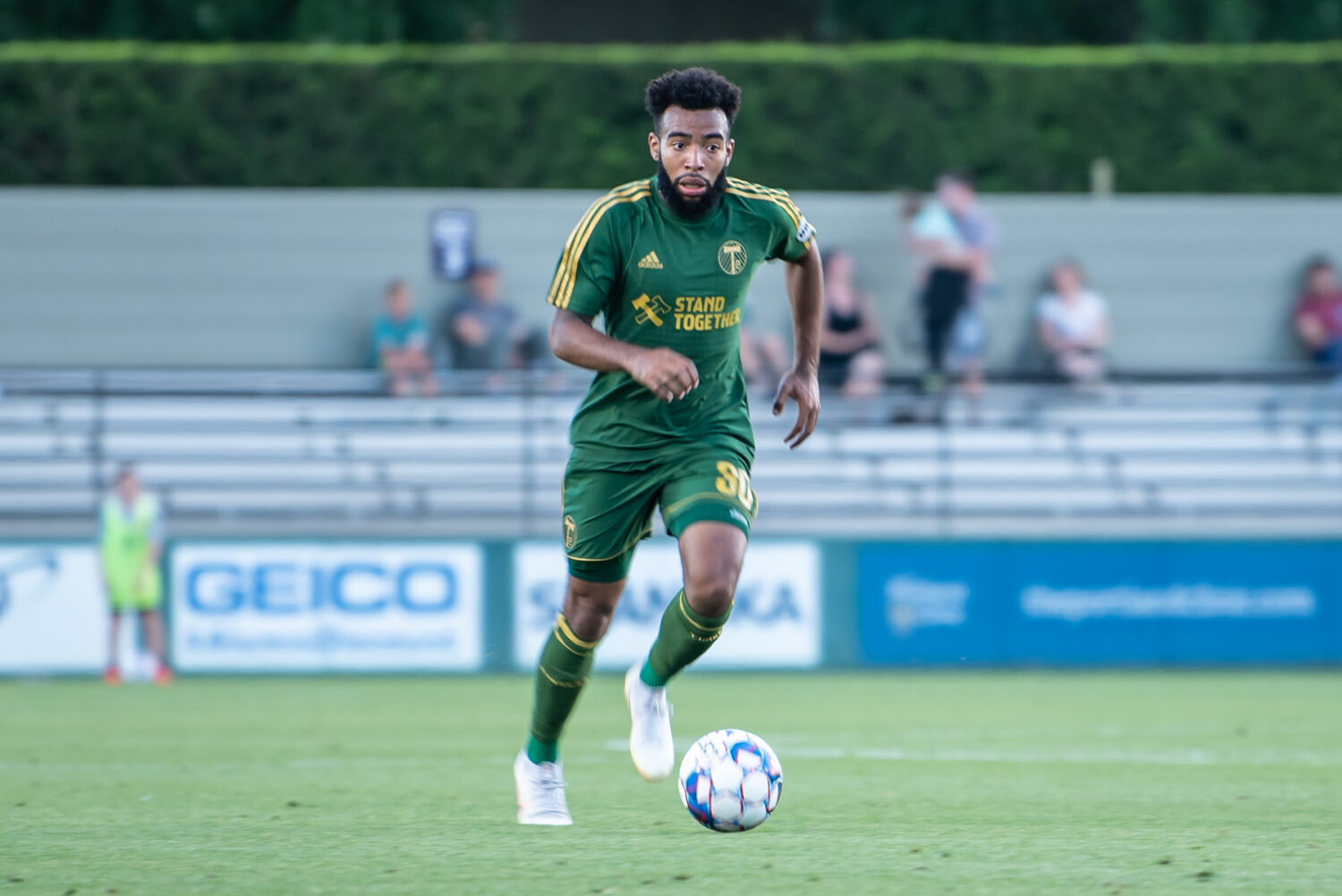
Williamson grew up in Alexandria, Virginia, just south of downtown DC, while Ebobisse grew up north of the city in nearby Bethesda, Maryland. Both were ‘97 kids who played a year up for their club teams—Williamson for the Annandale Firestorm and Ebobisse for the Olney Rangers.
The two first played against one another when they were 12 or 13 years old. Williamson said Ebobisse’s style immediately stood out, specifically the frosted tips the young forward sported. However, the hair—which Williamson later learned came from the chlorine in pools Ebobisse competitively swam in—paled in comparison to Ebobisse’s talent on the field.
Just five minutes into the game, Ebobisse took a shot 40 yards from goal, which rattled the crossbar and rebounded to Williamson in midfield. The Firestorm lost 6–1 that day.
As they grew older, the pair continued to compete against each other, Williamson in Virginia’s Olympic Development Program (ODP) system and Ebobisse for Maryland’s ODP.
Eventually, Williamson and Ebobisse became teammates on the United States U-20 youth national team, where they roomed together at international competitions. They often joked around and enjoyed each other’s company, but also spent plenty of time discussing their game on the field, providing one other with suggestions and constructive criticism.
The occasional deep conversations at night—whether about their personal lives or struggles on the field—helped their relationship blossom.
“We were really able to understand each other’s tendencies,” Ebobisse said. “The things that made us uncomfortable [and] the things that made us really click. By the end of our time there, it wasn’t one of those situations where we didn’t want to be around each other any more.”
The text popped up on Ebobisse’s phone out of the blue.
“RCTID…,” it read.
It consisted of just an acronym, but Ebobisse knew right away what Williamson meant. RCTID: Rose City ‘Til I Die, the Timbers’ recognizable social media hashtag. His close friend, who he grew up competing against and later roomed with, was about to become his teammate in Portland.
“I told him that he better not be messing with me,” Ebobisse said. “But it turns out that he had made the decision and what happened, happened. He was due to fly in 24 hours later and I was just excited.”
Ebobisse had spent a portion of that summer at his home in Maryland. He sometimes played pickup soccer at the nearby University of Maryland campus, where Williamson went to school. Right before Ebobisse returned to Portland for preseason, the two had an honest conversation about the young midfielder’s career goals.
At the time, Williamson was mulling over the decision to either stay in school and play collegiately for another season or to go pro. If he chose to go pro, Williamson told Ebobisse, he would probably end up at one of two different clubs, one being Portland. Still, Ebobisse never thought he would actually share the field with Williamson that very season.
Then the text arrived, sending Ebobisse scrambling to come up with a plan to welcome his friend to his adopted home.
He first volunteered to pick Williamson up from the airport, but a team official had that covered. Instead, Ebobisse took Williamson out to dinner at one of his favorite sushi spots in Portland, Bamboo Sushi, later that night. In a way, Ebobisse wanted to give his friend—completely new to the west coast—something he didn’t have when he first arrived in Portland.
“The previous year, I didn’t have many close relationships on the team,” Ebobisse said. “As a young rookie in an older locker room with a lot of cultural experiences, I didn’t necessarily find my footing immediately. That was definitely a helping hand in my process as much as I helped him as well.”
Off the field, Williamson and Ebobisse played board games like Settlers of Catan and explored the city, often taking trips to local coffee shops. They also roomed together on road trips, where they continued the honest conversations they had while with the youth national teams.
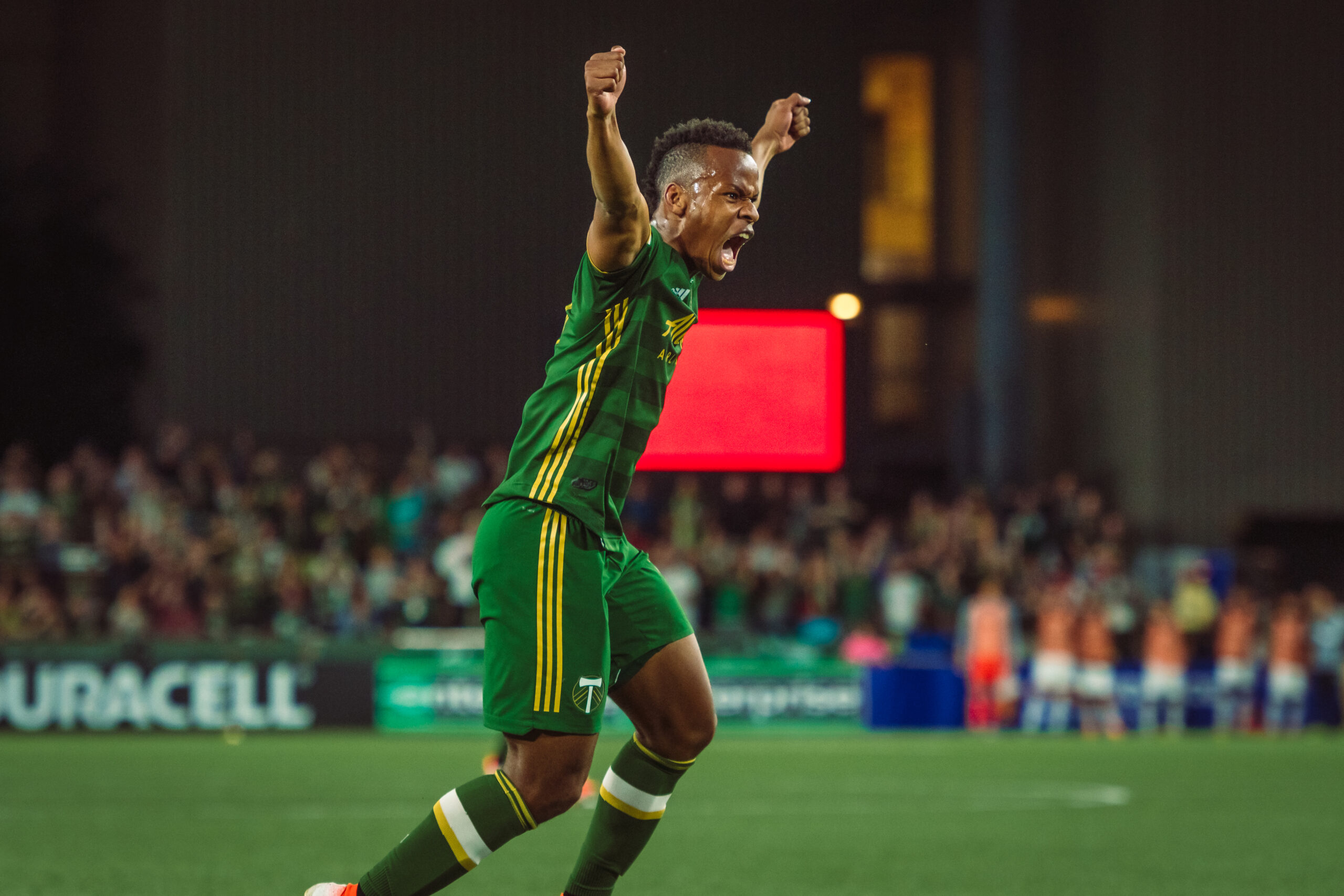
In 2019, specifically, those discussions really helped Williamson, who struggled to earn minutes with the first team while Ebobisse began to break into the starting eleven. The midfielder asked his friend about what he needed to get out of training and how he could stand out. While nothing changed immediately, those exchanges, which stemmed from their close bond, proved pivotal.
“When you spend that much time with someone, it’s not always going to be joking and laughter,” Ebobisse said. “Sometimes, it’s going to be about serious personal growth on both of our ends. We’ve both gone through a lot on the athletic front and then we’ve also had a lot of different experiences personally. They shaped the way that we do our jobs in the world and we trust each other to give and receive that advice.”
At the time, Ebobisse treaded lightly. He knew Williamson was working as hard as he could to earn time with the first team beyond US Open Cup games and heavily rotated midweek lineups. So, Ebobisse became his friend’s sounding board, having experienced similar early struggles prior to his breakthrough.
“I think he realized that he stepped in right when I think I needed it the most,” Williamson said. “There have been times, it may have been car rides either to or from an event or something along those lines, where it was reassuring. Although I’m not playing, people believe in me and want me to keep pushing.”
They’ve had those conversations more recently too, after neither received a call-up to the United States U-23s to take part in the 2020 Olympic qualifying tournament. Both Ebobisse and Williamson made the preliminary roster, but didn’t make the final cut for manager Jason Kreis’s 20-man team.
“I think we were both a little frustrated there, but we both know that this is a big year for us,” Williamson said. “We sat down and had that conversation. We can’t dwell on it and we have to keep moving forward. Ultimately we have each other and we will do it together.”
As the 2021 MLS season approaches, both are preparing to take another leap forward in their careers. Despite not making the Olympic qualifying roster, they are more confident than ever before, and a lot of that stems from those conversations and their close bond.
What began as a competitive relationship in the DC club soccer scene developed into a close bond built up during their time on youth national teams and now with the Timbers. So, regardless of what happens this season or in the future, the pair will always have one another.
It’s something Williamson is reminded of every day, thanks to the picture, in canvas form, that hangs from his apartment walls.
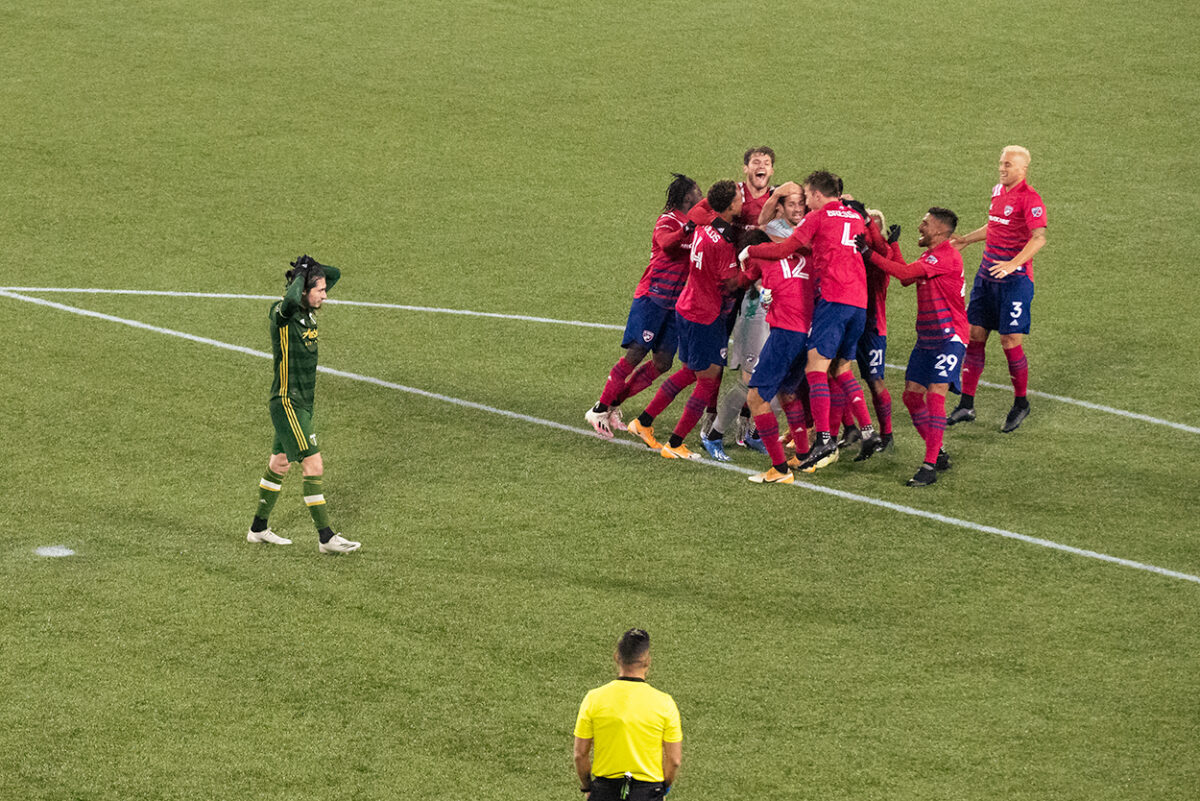
Jorge Villafaña turned and put his hands over his face. Diego Valeri started to walk off the field with his head down. Jeremy Ebobisse squatted down and rubbed his forehead.
Seconds after FC Dallas goalkeeper Jimmy Maurer dove to his left and punched the ball away, players in green and gold came to grips with the fact that their season was over.
“In a penalty shootout, anything can happen,” Valeri said, “and it’s just a tiny difference that changed the game. We are very disappointed with the way our season is ending, but our team left everything on the field. That’s why we have to be proud.”
Before Sunday night, the Timbers were a perfect 100% in their three games that came down to spot kicks this season. But penalty kicks are a game of chance, and it was Mauer, not Steve Clark, who guessed a kick correctly to help his team seal a playoff win.
The shootout went eight rounds, making it the third longest in MLS history. As it went on, the pressure to match FC Dallas make-for-make eventually became too much for Portland.
Villafaña, who just thirty minutes prior was the hero after he scored what looked to be the game-winning goal in the 82′, was the player whose missed penalty sealed the game.
“When you leave a game to PKs it can go either way,” Savarese said. “It’s unfortunate because we did everything to be able to win this match until that moment.”
That late moment Saverese referenced came in the 90+3′, just one minute prior to the final whistle.
With the Timbers up a goal and on the verge of advancing to the Western Conference Semifinals, 17-year-old Ricardo Pepi got behind Portland’s back line and slotted a deflected ball past Clark for an equalizing goal at the death.
Up until that point, Portland looked to be in control. But from then on, it was all FC Dallas — right until Maurer came up with the final save on Villafaña.
The late equalizer is the sixth goal the Timbers have conceded in stoppage-time this season. It was also the 15th goal the defense allowed after the 75′, which led the entire league.
Finding different ways to snatch defeat (or a draw) out of the jaws of victory is not exactly a new issue for this Portland team. There have been numerous warning signs throughout the year. Eventually, frustrating results turned into a legitimate trend.
Cracks first started to appear in an Aug. 29 game against Real Salt Lake at Providence Park. With just five minutes and stoppage time remaining, all the Timbers had to do was see out a 4-2 lead. Instead, RSL clawed all the way back and Sam Johnson tied the game at four in the 90+5′.
In late October, the Timbers were on track to beat LAFC until Portland conceded a late goal to 16-year-old Christian Torres in the 90+3′.
Four days later, Portland had a golden opportunity to leap over their bitter rivals, the Seattle Sounders, and into first place in the Western Conference. Instead, Will Bruin found himself wide open at the back post to head in an equalizing goal deep into second-half stoppage time.
And just three minutes into stoppage time against FC Dallas, Pepe’s goal swung all the momentum in the visitor’s favor.
“We, in the last minute, allowed a goal to come in that changed the trajectory of everything that we did well during the match,” Savarese said.
So, what made the Timbers so susceptible to conceding those late goals? It’s a question that could be argued all off-season.
At times, Portland struggled to capitalize on early chances that came back to bite when it entered stoppage time only up a goal. You could argue it is chance, but how much of conceding late is a psychological thing when it happens so frequently?
In the team’s MLS is Back Tournament run, they allowed four goals after the 80′, but Portland found enough goals to win those games. That didn’t happen in the MLS Cup playoffs.
But what was a heartbreaking conclusion shouldn’t overshadow all the Timbers accomplished in a season that spanned from March until November with a four-month break in between.
They won the league’s first––and hopefully only––MLS is Back Tournament trophy over the summer, and played some fun soccer doing it.
After months of uncertainty in 2019, club legend Diego Valeri returned to Portland and picked up where he left off. He ended the season with his 100th MLS assist when he played Villafaña in on goal against FC Dallas.
Gavin Wilkinson and the Timbers front office built up attacking depth over the offseason, and they needed all of it after Sebastián Blanco and Jarosław Niezgoda suffered season-ending injuries toward the end of the year. Jeremy Ebobisse, who broke out in many ways this season, dealt with a concussion over the past few weeks, and didn’t enter the game against FC Dallas until the 88′.
“It’s very frustrating,” Valeri said. “It’s a tough emotion, it’s hard to process now. But we have to rest well and scout the season to see why we had a good season, [find] what the positive things were that we did during the whole season and try to reinforce it.
An argument can be made that Portland was the better side Sunday night. Saverese alluded to that sentiment multiple times in his post game press conference. But MLS isn’t always fair; Portland learned that lesson the hard way against FC Dallas.
“We believed that even though we had adversity and players who were not with us, we still had a group that could go all the way,” Savarese said. “Unfortunately, now we are out and we have to plan for next year.”
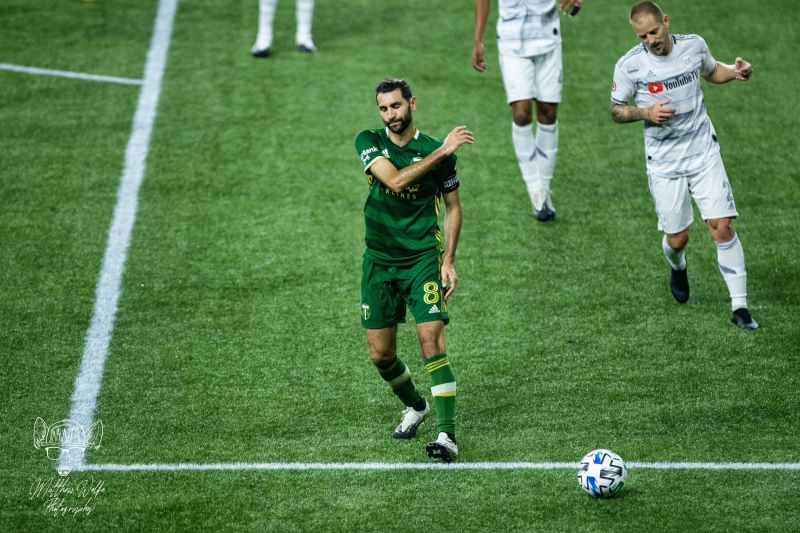
In a back-and-forth affair against LAFC on Sunday night, it was only fair that the Portland Timbers split the points with the visitors. Although the Timbers were able to grab the lead early in the second half, they faded late in the match and could not match the energy of LA in the final moments of the 1-1 draw.
The visitors set a frantic pace to start the match, pressing the Timbers all over the field and giving them little time to work their way into the game. With their passing so disrupted, the Timbers struggled to find chances on their home turf.
Instead, it was LAFC who came close to opening the scoring in the 10th minute, through none other than Bradley Wright-Phillips. A long ball down the middle of the pitch from Eduard Atuesta dropped perfectly into the path of BWP’s run behind the Timbers backline. Sticking a boot out, Wright-Phillips got a touch on the ball to help it toward goal, but the veteran goal-scorer could only direct it toward Steve Clark, who held the ground and made the required save.
The close call marked the Timbers’ entrance into the game as LAFC’s press faded and the home side found their footing.
Thus emboldened, the Timbers managed a chance of their own in the 15th minute as they nearly made the most of a series of passes around the LA box. Working the ball around the attacking end and moving the LAFC defense from one side of the pitch to the other, the Timbers finally found Felipe Mora just inside the box in a patch of space. As the recovering LA defenders scrambled toward him, Mora got off a shot just a moment too late, having it blocked off his boot.
As the half wore on, the Timbers took control of the match, keeping the visitors from making regular moves forward and, in the final minutes of the half, finding another series of chances for themselves.
In the 38th minute, the Timbers found Diego Valeri out wide on the right side of the LA box. Valeri quickly turned on the ball and clipped a curling ball across the face of goal. Valeri’s ball found a surging run into the center of the box from Mora, and the Timbers forward threw himself toward the ball, making solid contact and sending a powerful header on goal that Pablo Sisniega was forced to parry away.
Two minutes later the Timbers came even closer. A ball over the LA backline from Yimmi Chará dropped into Mora’s path and the Chilean controlled the ball with his head and pressed forward. With a defender pulling at his shirt, Mora stayed on his feet in the LAFC box and managed to get a shot off, but Sisniega, given time by the foul on Mora, was able to rush off his line and make the save.
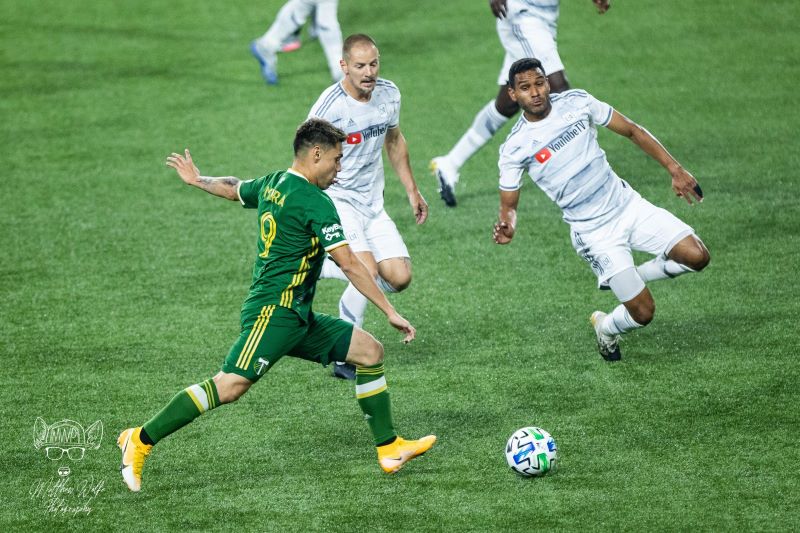
Valeri managed a final first-half chance for the Timbers in the 43rd minute when he received the ball in space outside the LA box. Striding on to the ball, Valeri hammered a dipping shot on goal, but Sisniega was able to make a diving save to push the ball away.
The Timbers kept the momentum going into the second half and, just two minutes in, they found the opener. The chance started with a darting run toward the box from Chará, who checked his run and hit a square ball to Mora. Receiving the ball at the top of the box, Mora turned and continued its progress, finding Jeremy Ebobisse arriving on the right. Ebobisse took the ball in, touched it forward, and smashed a low shot on goal that Sisniega was able to get a touch on, but could not keep from splashing into the back of the net.
Now trailing, LAFC caught their breath and looked to fight their way back into the match.
Putting the Timbers on the back foot, LA got their first real chance to pull the match even in the 60th minute. After Mohamed El-Munir got around Jorge Villafaña on a driving run to the end line, the LA fullback cut a low ball back into the box for the run of Danny Musovski. As Musovski met the ball in the center of the Timbers box, he hit it first time, sending a shot through traffic that forced Clark to get low in order to parry the ball away. The rebound fell to winger Kwadwo Opoku, but the Ghanaian teen could not steer it on goal.
The Timbers came close to extending their lead in the 84th minute. With Eryk Williamson carrying the ball toward the LA box, Chará made a cutting run toward goal. Williamson saw Chará go and slipped a perfectly weighted pass into his path. Bringing the ball in with a defender hanging off his back, Chará got off a quick shot from close range, but Sisniega was able to get down and make the stop.
Sisniega’s saves would turn out to be the difference between three points and just one for the Timbers, as LAFC were able to find a stoppage-time equalizer in the 93rd minute. After a giveaway from the Timbers in the center of the pitch, Eddie Segura got on the ball in an advanced position and played a quick pass toward Opoku at the top of the box. Opoku spun on the ball, giving it a touch forward in the process and putting it into the path of Christian Torres. Running onto the ball and in on goal, Torres was able to finish one on one with Clark and draw the sides even at the last possible second.
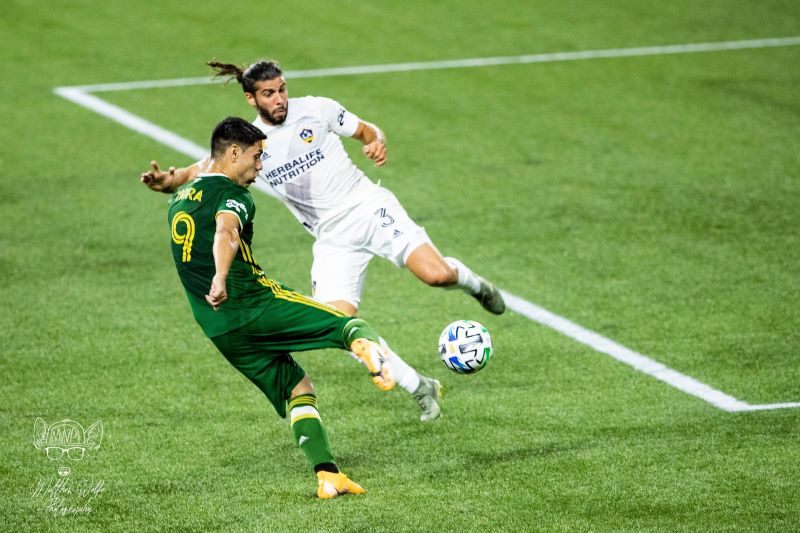
After an unexpectedly long break, the Portland Timbers were back in action on Wednesday night and were clearly determined to make up for lost time against the LA Galaxy. Despite a Galaxy side who were up for a fight, the Timbers went off, beating LA 6-3 on the road.
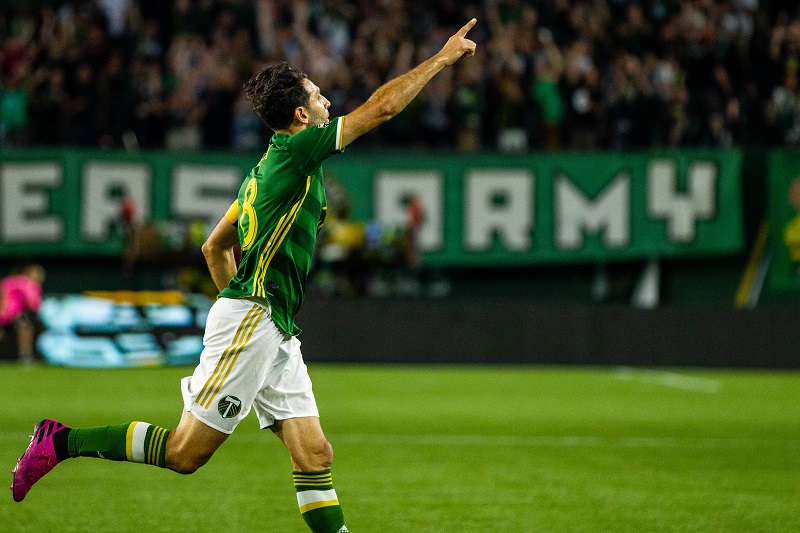
The Portland Timbers brought home all three points from Saturday night’s road match against the San Jose Earthquakes, dissecting their hosts in a game that finished 6-1 to the good.
The Timbers started the match looking energized, taking advantage of the fresh legs in Giovanni Savarese’s starting XI to put the Quakes under pressure from the opening whistle. That pressure nearly paid off early on, as the Timbers were able to quickly create several chances off turnovers—including a Jeremy Ebobisse shot from the top of the box in the third minute that skipped just wide.
As things settled down into a pattern of fouls and disrupted passes, the Timbers lost some of their early advantages, but soon found a new avenue of attack through Bill Tuiloma and Julio Cascante carrying the ball forward from their positions at centerback and forcing the Quakes to lose their marks in order to step out and confront them.
With the match once again opening up for the Timbers, the visitors were quickly about to find a pair of back to back goals in the span of just three minutes.
First, in the 25th minute, off a corner kick Cristhian Paredes fought for control of the ball at the top of the San Jose box with Shea Salinas. In an attempt to touch the ball past the Quakes defender, Paredes popped the ball up into the air only for it to strike Salinas on the arm. Referee Rosendo Mendoza had no hesitation in blowing his whistle and pointing to the spot, and, despite the protestations of the Quakes, his call was upheld by the video assistant referee.
Diego Valeri, back in the XI after staying on the bench for the Timbers’ midweek draw against San Jose, stepped up to the penalty spot and hit a low, hard shot to the tight of Daniel Vega, beating the Quakes keeper for the opening score.
Just two minutes, later the Timbers were once again back in the attacking end, and again they struck in the aftermath of a spot kick—this time a free kick served in from long distance by Diego Valeri that was not properly cleared. After the ball was headed away from the box, Paredes played it back to Jorge Villafaña in space, and the Timbers fullback hit a curling cross into the box. As the ball dropped at the back post, Ebobisse rose up above the crowd and hit a skipping header off the pitch that bounced off the pitch and past Vega before nestling into the back of the net.
Of course, it would not be a Timbers game without opposition chances late in the half.
A pair of chances for the Quakes called Aljaž Ivačič into action during his first start for the first team. First, a chipped ball into the Timbers box found Carlos Fierro lurking between Cascante and Tuiloma for a snap header from inside ten yards. Ivačič was equal to the moment, though, and came up with a fantastic reflex save to palm the ball away before sticking out a leg on the follow-up shot to deny Nick Lima as well.
In the 44th minute, however, the Quakes opened their account. A low cross from Salinas out wide on the Timbers’ right found the run of Fierro entering into the box. The Quakes midfielder took the ball in stride, hitting a swerving first-time shot that blew past the dive of Ivačič and splashed into the back of the net to pull the scoreline to 2-1.
Early in the second half, the Timbers reclaimed their two-goal lead. In the 58th minute, Diego Chará pounced on a loose ball in the Quakes’ end and cut an angled ball back toward the top of the box. As a group of players scrambled toward the ball, it was the late-arriving run of Valeri that got the Maestro to the ball first. Valeri hit the ball on the run, powering a shot into a crowd of defenders that pinballed off two pairs of legs before wrong-footing Vega and rolling over the goal line to put the Timbers up 3-1.
The Timbers further extended their advantage in the 70th minute when they capitalized on another moment of confusion in the Quakes’ end. After a turnover deep in the San Jose half, Ebobisse got on the ball at the top of the box and, after creating space for himself on the dribble, hit a low shot along the turf that forced Vega into a diving save. The San Jose keeper got a hand to the ball, but it was Yimmi Chará who was first to react, dashing forward past the Quakes backline and tapping home a side-footed shot from point-blank range.
As the match wrapped up, the Timbers grabbed another. After D. Chará took the ball into the corner and was fouled in the 85th minute, Valeri stepped up to the free kick and served an out-swinging ball into the box. The service was perfectly weighted for Cascante, who had pushed forward for the opportunity, and the Costa Rican center back outjumped his defender to put a nodding header down off the turf and past Vega for goal number five.
Now facing a thoroughly demoralized San Jose side, the Timbers scored their sixth in the 87th minute to close the match out. A string of passes through the Quakes end carried the Timbers into the box and it was D. Chará who played a square ball into the path of Jarosław Niezgoda ten yards from goal. Jarek swept a shot forward that deflected off a defender and over Vega for the final goal of the night.
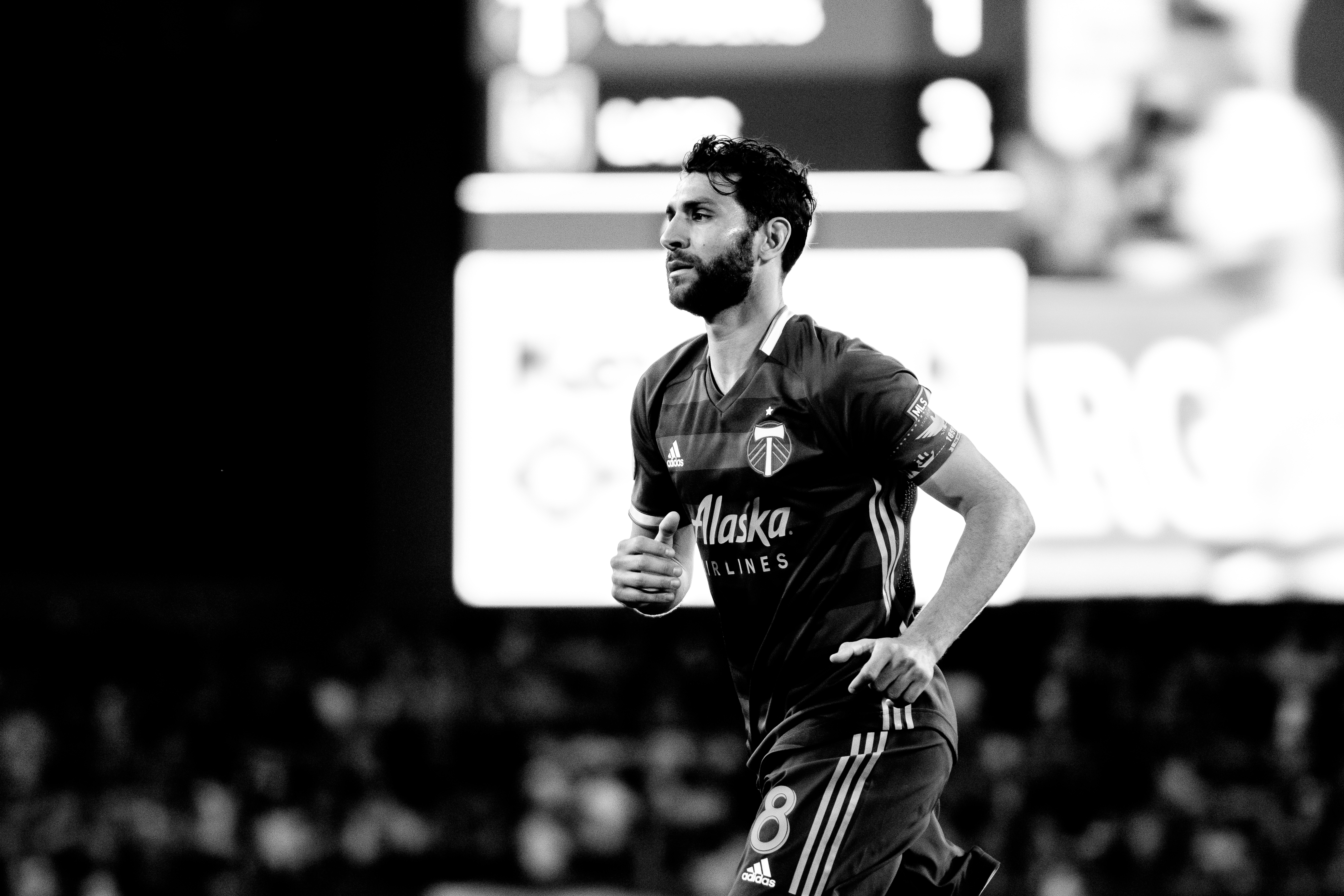
Despite starting Sunday night’s match on the front foot, the Portland Timbers were sent reeling by LAFC late in the first half and never recovered, losing 4-2 to the Californian side.
Playing on the conspicuously wet field at Banc of California Stadium, both sides seemed hesitant in the early going. While the Timbers weathered some early pressure from LAFC, they were soon able to settle into their familiar low defensive block, leaving the more adventurous play to the home side who had struggled to score in their previous two matches.
Chances were scarce for both sides until the Timbers opened the scoring in the 25th minute. After running on to a ball down the left flank, Diego Valeri cut a pass back to the top of the box where Felipe Mora was lurking. Rather than taking a shot into a pack of defenders, Mora spun and continued the progress of the ball across the field, rolling a pass into the path of Eryk Williamson on the left. With space in front of him, Williamson drove toward goal before juking an LA defender and slotting the ball past LAFC keeper Pablo Sisniega for the score.
The goal was enough to energize LAFC and the home side responded with a flurry of attacks that the Timbers struggled to contain. A series of balls into the Timbers box asked questions of Steve Clark and his backline, with the ball even winding up in the net once only to have Diego Rossi’s finish called back because he was in an offside position.
Finally, in the 37th minute, LA got their equalizer. A corner kick whipped in by Brian Rodriguez found the run of Bradley Wright-Phillips at the near post where the journeyman goalscorer flicked the ball on with his head. The helpful touch perfectly evaded the Timbers defense and fell at the back post just as Mark-Anthony Kaye arrived for a straight-forward touch over the line.
The hosts’ second goal of the night came from the run of play but was no less well worked than their first. Breaking down the pitch and into the Timbers’ end in the 41st minute, Brian Rodriguez played a diagonal ball from the center of the pitch to Rossi making a darting run inside from the Timbers’ right. Timing his run perfectly, Rossi received the ball in behind the defense and, as Clark rushed out to close him down, hit a curling shot past the keeper for a simple, smooth finish.
With the Timbers still reeling and unable to recover, LAFC kept the pressure on and, in the first minute of first-half stoppage time, the hosts scored their third. After a dangerously placed free-kick was knocked down in the Timbers box, Rodriguez got on the ball and played a square pass across the face of goal to Wright-Phillips. Unmarked, Wright-Phillips had no trouble putting a boot to the ball and knocking it over the line to take a 3-1 lead.
In the final minute of first-half stoppage time, however, the Timbers snatched the momentum back. Pushing quickly down the pitch, Jorge Villafana hit an early diagonal ball into the LA box that dropped into the path of Jeremy Ebobisse. Rising up to the ball, Ebobisse nodded it forward; dropping the ball over Signiega, under the bar, and over the goal line to pull the Timbers back within one.
The Timbers came close to pulling even in the 62nd minute after Diego Valeri was tripped up at the top of the LA box. After earning the foul, Valeri stepped up to the free-kick and hit a cutting ball through a gap in the wall onto to see it sting off the woodwork and fly away from goal.
The remainder of the second half was less promising as the Timbers struggled to get the ball into the attacking end with any sense of purpose. Despite flashes of skill from the attacking group, the Timbers could not find an equalizer in the final half-hour of the match.
Adding one final insult, LAFC grabbed an insurance goal in the 95th minute when Kaye played substitute Danny Muovski in on goal for a one on one finish around Clark that sealed the deal for LA and sent the Timbers home without a single point.
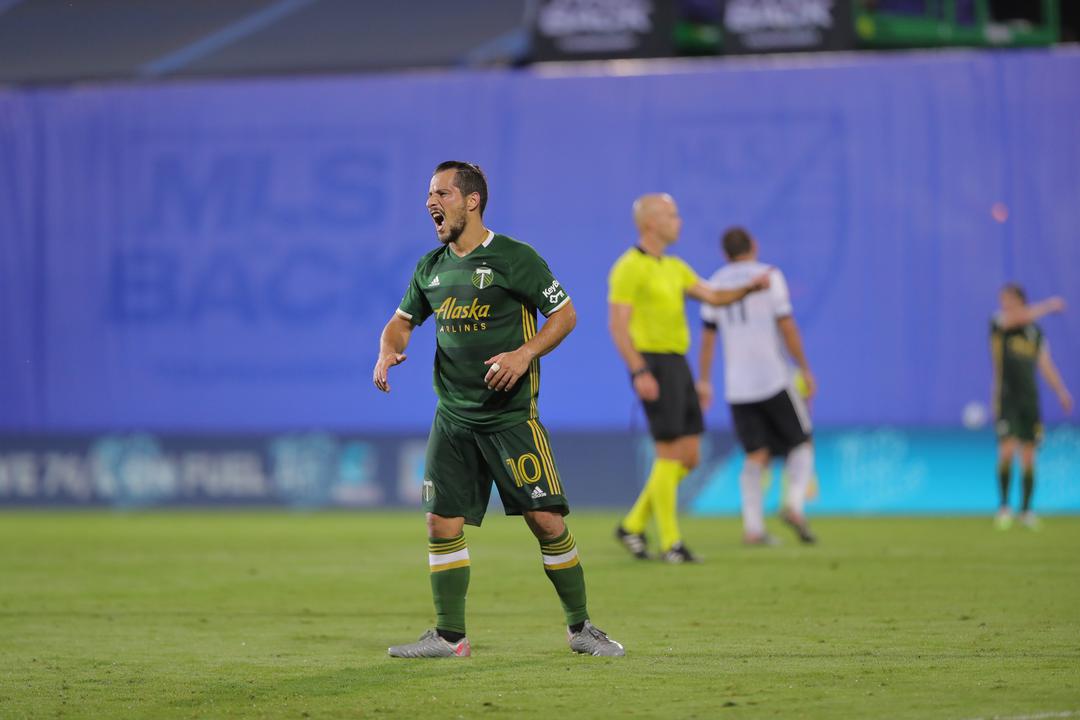
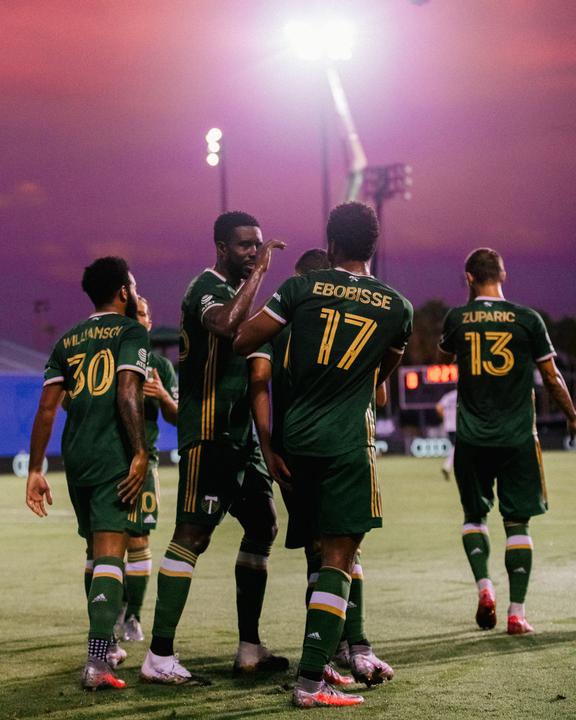
The Portland Timbers are going to the MLS is Back Tournament Final after taking down the Philadelphia Union 2-1 in a battle of the set-pieces.
